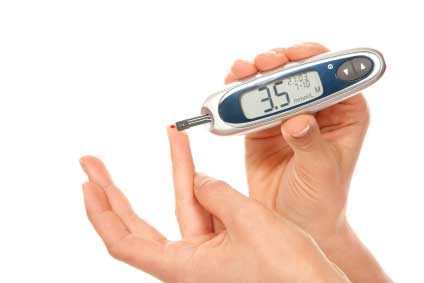
Diabetes Mellitus is the term used by doctors for Diabetes, a long term condition. A group of metabolic diseases cause diabetes. Due to inadequate production of insulin, the person has high levels of blood sugar or blood glucose, and also cells in the body do not respond to insulin properly thus causing diabetes. Hunger, increasing thirst and frequent urination are typically experienced by patients having high blood sugar.
Diabetes is of 2 types, that is Type 1 Diabetes and Type 2 Diabetes. In Type 1 Diabetes, insulin is not produced by the body. Approximately 10 percent of cases are of Type 1 Diabetes. In Type 2 Diabetes, enough insulin is not produced by the body for proper functioning. Around 90 percent people suffer from Type 2 Diabetes. The other type of Diabetes is Gestational Diabetes in which females are affected during their pregnancies.
Symptoms commonly seen are tingling and numb feeling in feet and hands, unusual loss of weight, frequent urination, sexual dysfunction in males, intense hunger and thirst, fatigue and bruises and cuts that do not heal.
A plan for healthy eating must be followed for treating Type 1 Diabetes. To lead a normal life, insulin is to be taken besides adequate exercise. In case of Type 2 Diabetes, the person must be active physically and follow healthy eating pattern. Besides this, they may have to take insulin for controlling levels of glucose and also take oral medication. Diabetes patients can face risk of low blood glucose called Hypogylcemia and cardiovascular disease. They must avoid smoking.
To determine Diabetes the doctor checks whether metabolism of the patient is normal, via the A1C test, the FPG – Fasting Plasma Glucose test and the OGTT – Oral Glucose Tolerance Test.
Diabetes of all types can be treated with effective treatment. However there is no known cure for Type 1 Diabetes. Type 2 Diabetes lasts for entire life, usually, however with proper weight control, diet and exercise, symptoms are not difficult to get rid of.
Special diets, insulin injections, exercise and medication can help reduce complications of the disease. If diabetes is badly controlled then it could lead to complications of the eye, foot, skin, heart and ailments like disturbance of mental health, depression, gum disease, ketoacidosis, neuropathy, hearing loss, gastroparesis, stroke, erectile dysfunction and difficulty in healing of wounds.








